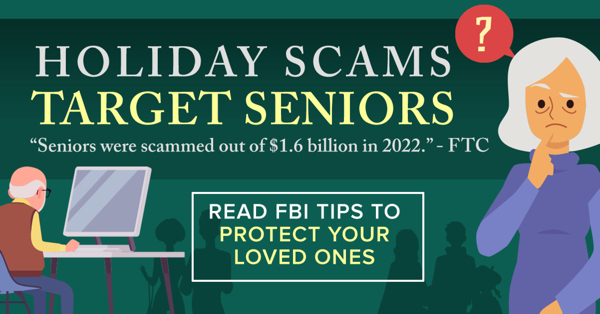The holiday season brings out the best in most people. But for some, it brings out the worst. Experts say scams targeting older people ramp up this time of year, because seniors are typically more vulnerable and more charitable around the holidays.
“Seniors who live alone, have memory issues or don’t understand technology are especially vulnerable,” said Sierra Goetz, co-founder and operations manager at Tudor Oaks Home Care’s partner, the HomeCare Advocacy Network (HCAN).“Unfortunately, the holiday season provides many opportunities for scammers to prey on older people – turning what’s supposed to be the most joyous time of the year into a nightmare.”
According to the Federal Trade Commission, seniors were scammed out of $1.6 billion in the last year alone. Most holiday scams are aimed at getting the victim’s credit card number and other personal data that the fraudsters can use for identity theft or to sell on the dark web, including:
Coupon or Gift Card Confirmation Emails. Scammers send malware-loaded links or attachments in emails with bogus offers or confirmations.
Charity scams. It’s relatively easy for scammers set up fake websites, using familiar logos and verbiage, to take advantage of those who want to make donations but aren’t tech-savvy enough to recognize the sites are bogus.
Shopping scams. Like charity scams, fraudsters set up lookalike websites in hopes of tricking holiday shoppers into thinking they’re doing business with a legitimate retailer.
Delivery scams. As online shopping becomes more and more popular, so do delivery scams. Crooks send out phishing emails disguised as UPS, FedEx or U.S. postal service notifications that ask for credit card confirmation or other personal information.
Letter from Santa scams. A letter from St. Nick can be a holiday treat for little ones, and many legitimate businesses offer them. Unfortunately, so do many scammers who are looking scavenge information about about seniors and their families.
So, how can you keep your aging loved one from becoming a victim of financial fraud? Experts at the FBIrecommend you encourage them to:
Practice good cybersecurity hygiene
- Avoid clicking on suspicious links or attachments in emails, on websites and social media.
- Be especially wary if a company asks them to update their password or account information.
Know who they’re buying from.
- Check each website’s URL to make sure it’s legitimate and secure.
- If they’re purchasing from a company for the first time, they should do their research and check reviews.
Be careful how they pay.
- Never wire money directly to a seller.
- Avoid paying for items with gift cards. In these scams, sellers will ask them to send them a gift card number and PIN. Instead of using that gift card for payment, the scammer steals the funds and never sends the items.
- Use a credit card when shopping online and check statements regularly.
- Report suspicious transactions to their credit card company and dispute the charge.
Monitor the shipping process.
- In order to follow the shipping/delivery process, they should always get tracking numbers for items purchased online.
“While we certainly can’t stop scammers from targeting seniors, our professional caregivers are trained to watch for red flags,” Goetz said. “If time or distance keeps you from spending as much time as you would like with your aging loved ones, we can help make them aware of suspicious online activity, listen for unusual phone conversations and more. We’ll alert you immediately if we suspect problems.”
For more information about Tudor Oaks Home Care’s customized care plans, visit TudorOaksHomeCare.com.
If you suspect your aging loved one has been the victim of a scam, these organizations can help – The National Adult Protective Services Association, eldercare.gov, The National Center on Elder Abuse, AARP Foundation Elderwatch and the Federal Trade Commission.
